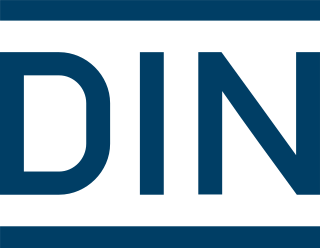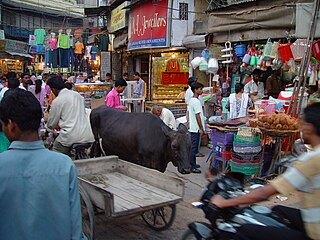
Deutsches Institut für Normung e.V. is the German national organization for standardization and is the German ISO member body. DIN is a German Registered Association (e.V.) headquartered in Berlin. There are currently around thirty thousand DIN Standards, covering nearly every field of technology.

Microeconomics is a branch of mainstream economics that studies the behavior of individuals and firms in making decisions regarding the allocation of scarce resources and the interactions among these individuals and firms. Microeconomics focuses on the study of individual markets, sectors, or industries as opposed to the national economy as whole, which is studied in macroeconomics.

In microeconomics, supply and demand is an economic model of price determination in a market. It postulates that, holding all else equal, in a competitive market, the unit price for a particular good, or other traded item such as labor or liquid financial assets, will vary until it settles at a point where the quantity demanded will equal the quantity supplied, resulting in an economic equilibrium for price and quantity transacted. It forms the theoretical basis of modern economics.
In economics, economic equilibrium is a situation in which economic forces such as supply and demand are balanced and in the absence of external influences the values of economic variables will not change. For example, in the standard text perfect competition, equilibrium occurs at the point at which quantity demanded and quantity supplied are equal.

Allgemeine Elektricitäts-Gesellschaft AG was a German producer of electrical equipment founded in Berlin as the Deutsche Edison-Gesellschaft für angewandte Elektricität in 1883 by Emil Rathenau. During the Second World War, AEG worked with the Nazi Party and benefited from forced labour from concentration camps. After World War II, its headquarters moved to Frankfurt am Main.
In economics, quantity adjustment is the process by which a market surplus leads to a cut-back in the quantity supplied or a market shortage causes an increase in supplied quantity. It is one possible result of supply and demand disequilibrium in a market. Quantity adjustment is complementary to pricing.

The Deutsche Bundesbahn or DB was formed as the state railway of the newly established Federal Republic of Germany (FRG) on 7 September 1949 as a successor of the Deutsche Reichsbahn-Gesellschaft (DRG). The DB remained the state railway of West Germany until after German reunification, when it was merged with the former East German Deutsche Reichsbahn (DR) to form Deutsche Bahn, which came into existence on 1 January 1994.
In economics, tax incidence or tax burden is the effect of a particular tax on the distribution of economic welfare. Economists distinguish between the entities who ultimately bear the tax burden and those on whom tax is initially imposed. The tax burden measures the true economic weight of the tax, measured by the difference between real incomes or utilities before and after imposing the tax, taking into account how the tax leads prices to change. If a 10% tax is imposed on sellers of butter, for example, but the market price rises 8% as a result, most of the burden is on buyers, not sellers. The concept of tax incidence was initially brought to economists' attention by the French Physiocrats, in particular François Quesnay, who argued that the incidence of all taxation falls ultimately on landowners and is at the expense of land rent. Tax incidence is said to "fall" upon the group that ultimately bears the burden of, or ultimately suffers a loss from, the tax. The key concept of tax incidence is that the tax incidence or tax burden does not depend on where the revenue is collected, but on the price elasticity of demand and price elasticity of supply. As a general policy matter, the tax incidence should not violate the principles of a desirable tax system, especially fairness and transparency. The concept of tax incidence is used in political science and sociology to analyze the level of resources extracted from each income social stratum in order to describe how the tax burden is distributed among social classes. That allows one to derive some inferences about the progressive nature of the tax system, according to principles of vertical equity.
The Deutsche Gesellschaft für Internationale Zusammenarbeit (GIZ) GmbH, often shortened to simply GIZ, is the main German development agency headquartered in Bonn and Eschborn that provides services in the field of international development cooperation and international education work. It is the organization's self-declared goal to deliver effective solutions that offer people better prospects and sustainably improve their living conditions.
The law of supply is a fundamental principle of economic theory which states that, keeping other factors constant, an increase in price results in an increase in quantity supplied. In other words, there is a direct relationship between price and quantity: quantities respond in the same direction as price changes. This means that producers are willing to offer more of a product for sale on the market at higher prices by increasing production as a way of increasing profits.

The DQ and QR class were a class of diesel locomotives in New Zealand and Tasmania, Australia. Originally built by Clyde Engineering in the 1960s as Queensland Rail 1460 and 1502 class locomotives, they were purchased by Tranz Rail in 1995 to be rebuilt, as a cheaper alternative to buying new locomotives.
IATF 16949:2016 is a technical specification aimed at the development of a quality management system which provides for continual improvement, emphasizing defect prevention and the reduction of variation and waste in the automotive industry supply chain and assembly process. It is based on the ISO 9001 standard and the first edition was published in June 1999 as ISO/TS 16949:1999. IATF 16949:2016 replaced ISO/TS 16949 in October 2016.

The Ducati 848 is a sport bike with a 849 cc (51.8 cu in) 90° V-twin engine made by Ducati. It was announced on November 6, 2007 for the 2008 model year, replacing the 749. The 848 and the 1098 are the same design by Giandrea Fabbro, both use the same frame and bodywork. The first generation 848 makes a claimed 92 kW 10,000 rpm and 90 N⋅m (66 lbf⋅ft) torque at 8,240 rpm. With a manufacturer claimed dry weight of 168 kg (370 lb), the 848 is 5 kg (11 lb) lighter than its larger displacement sibling, the 1198. The first generation 848 covered model years 2008, 2009 and 2010. In July 2009 the 848 Hayden Limited Edition was introduced as a 2010 model as a marketing tie-in with world champion Nicky Hayden racing for Ducati starting from the 2009 Moto GP season.

The Ducati Monster 696 is a standard or "naked" motorcycle, made by Ducati from 2008 through 2014.
QS World University Rankings is an annual publication of university rankings by Quacquarelli Symonds (QS). The QS system comprises three parts: the global overall ranking, the subject rankings, and five independent regional tables—namely Asia, Latin America, Emerging Europe and Central Asia, the Arab Region, and BRICS.
DQS Holding GmbH based in Frankfurt am Main is the holding company of the worldwide DQS Group. The group provides assessments and certifications of management systems and processes of any type.

DGQ is a membership organization, which was founded in 1952 by Technical Statistics Committee under Committee for Economical Production. Since 1972, DGQ is legally independent under its present name.
The Ducati 239 Mark 3 is a 340 cc (21 cu in) single cylinder bevel drive SOHC motorcycle produced by the Italian manufacturer Ducati in limited quantities for the French market in 1974. The French Government has announced that they were to increase VAT on motorcycles of 240 cc and above in 1975. Ducati responded by producing the 239 to take advantage of the lower 20% VAT rate on sub-240 machines. To compensate for the reduced capacity, the engine was tuned to produce more power with a different camshaft, slipper piston, 30 mm carburettor and a different exhaust using a Lafranconi silencer.








